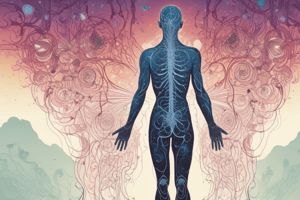Podcast
Questions and Answers
How does the biopsychological perspective explain mental disorders like schizophrenia?
How does the biopsychological perspective explain mental disorders like schizophrenia?
It attributes such disorders to genetic causes and other biological factors.
What are some biological factors that the biopsychological perspective considers to influence behavior?
What are some biological factors that the biopsychological perspective considers to influence behavior?
Hormones, heredity, brain chemicals, and diseases are biological factors considered.
In what way do biopsychologists study learning and memory?
In what way do biopsychologists study learning and memory?
They investigate the biological underpinnings affecting cognitive processes.
What role do hormones play in the biopsychological perspective of behavior?
What role do hormones play in the biopsychological perspective of behavior?
Give an example of how a biopsychologist might approach the study of aggression.
Give an example of how a biopsychologist might approach the study of aggression.
Why might multiple factors, including biological ones, contribute to mental disorders?
Why might multiple factors, including biological ones, contribute to mental disorders?
What does research in biopsychology suggest about the relationship between genetics and behavior?
What does research in biopsychology suggest about the relationship between genetics and behavior?
How might the biopsychological perspective change our understanding of mental health treatment?
How might the biopsychological perspective change our understanding of mental health treatment?
What is the primary focus of the modern psychodynamic perspective?
What is the primary focus of the modern psychodynamic perspective?
How did Skinner contribute to behavioral psychology?
How did Skinner contribute to behavioral psychology?
What is a key principle of humanistic psychology as proposed by Maslow and Rogers?
What is a key principle of humanistic psychology as proposed by Maslow and Rogers?
Identify a fundamental idea of cognitive psychology.
Identify a fundamental idea of cognitive psychology.
Describe the biopsychological perspective in terms of behavior.
Describe the biopsychological perspective in terms of behavior.
What ethical considerations arise from studies akin to Watson and Rayner's 'Little Albert' experiment?
What ethical considerations arise from studies akin to Watson and Rayner's 'Little Albert' experiment?
In what ways have Freudian techniques been modified for contemporary therapy practices?
In what ways have Freudian techniques been modified for contemporary therapy practices?
What role does reinforcement play in behavioral psychology according to B.F. Skinner?
What role does reinforcement play in behavioral psychology according to B.F. Skinner?
What does the bystander effect demonstrate about human behavior in social situations?
What does the bystander effect demonstrate about human behavior in social situations?
How might the sociocultural perspective assess the bystander effect in different cultures?
How might the sociocultural perspective assess the bystander effect in different cultures?
What is biopsychology's primary focus in understanding behavior?
What is biopsychology's primary focus in understanding behavior?
How does cognitive neuroscience relate to biopsychology?
How does cognitive neuroscience relate to biopsychology?
What is one major criticism of the psychodynamic theory in modern psychology?
What is one major criticism of the psychodynamic theory in modern psychology?
What does behavioral psychology emphasize in shaping behavior?
What does behavioral psychology emphasize in shaping behavior?
How do humanistic psychologists differ from psychodynamic theorists in their approach?
How do humanistic psychologists differ from psychodynamic theorists in their approach?
What role do cognitive processes play in understanding behavior from a cognitive psychology perspective?
What role do cognitive processes play in understanding behavior from a cognitive psychology perspective?
Flashcards are hidden until you start studying
Study Notes
Biopsychological Perspective
- Human and animal behavior is attributed to biological events in the body, including hormones, heredity, brain chemicals, and nervous system activity.
- Key biological causes of behavior and mental events include diseases, genetic influences, and hormonal changes.
- Biopsychologists study various topics such as sleep, emotions, aggression, sexual behavior, learning, memory, and psychological disorders.
- Disorders often have multiple causes, but biopsychology emphasizes biological factors as significant contributors.
- Genetic evidence supports the hereditary link to schizophrenia, characterized by delusions, hallucinations, and distorted thinking.
Related Fields
- Biopsychology is part of the broader field of neuroscience, which examines the structure, function, and development of the nervous system.
- Cognitive neuroscience overlaps with biopsychology, focusing on physical changes in the brain during mental processes.
- Other significant perspectives in psychology include the sociocultural perspective, which studies the interplay of social behavior and culture.
Historical Contributions
- Various historical figures have shaped the field of psychology, including Wilhelm Wundt, William James, John Watson, and Sigmund Freud.
- Modern psychodynamic perspective builds upon Freud's theories, focusing on the unconscious mind and motivations behind behavior, while also incorporating contemporary modifications.
Research and Culture
- The bystander effect is a key phenomenon studied in social psychology, indicating that the presence of bystanders can reduce the likelihood of an individual receiving help in a crisis.
- Cross-cultural research is essential in determining whether psychological effects, like the bystander effect, manifest similarly across different cultures.
Modern Perspectives
- Seven modern perspectives exist in psychology, with no single perspective fully explaining human behavior and mental processes.
- Contributions from figures like Skinner, Maslow, and Rogers have influenced contemporary psychological theories and therapeutic practices.
Studying That Suits You
Use AI to generate personalized quizzes and flashcards to suit your learning preferences.




